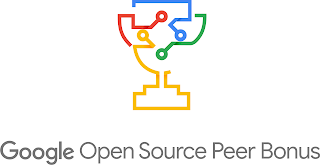In 2011 we launched the Google Open Source Peer Bonus program with the goal of supporting the ecosystem and sustainability of open source by rewarding external developers for their contributions to open source projects. Over the years the program has grown and expanded. Now we reward not just software developers but all types of contributors, including technical writers, user experience and graphic designers, community managers and marketers, mentors and educators, ops and security experts.
We are very pleased to announce the latest Google Open Source Peer Bonus Winners and their projects. We have a record number of 90 recipients this cycle representing 20 countries all over the world: Australia, Belgium, Canada, China, France, Germany, India, Italy, Japan, the Netherlands, Poland, Russia, Singapore, Slovakia, South Africa, Spain, Sweden, United Kingdom, Ukraine and USA.
Below is the list of projects and awardees who gave us permission to thank them publicly:
| Name | Project | Name | Project |
| Cyril Tovena | Agones | Vincent Demeester | Knative Build Pipeline |
| Rebecca Close | AMPHTML | Nader Ziada | knative/build |
| Leon Tan | AMPHTML | Jim Angel | Kubernetes |
| Wassim Chegham | Angular | Zach Arnold | Kubernetes |
| Paul Gschwendtner | Angular Material | Serguei Bezverkhi | Kubernetes |
| Maxim Koretskyi | Angular-in-depth blog | Damini Satya Kammakomati | Kubernetes |
| Kaxil Naik | Apache Airflow | Jennifer Rondeau | Kubernetes |
| Kohei Sutou | Apache Arrow | Michael Fromberger | Kythe |
| Matthias Baetens | Apache Beam | Mark Brown | Linux kernel |
| Lukazs Gajowy | Apache Beam | Luis Chamberlain | Linux Kernel |
| Suneel Marthi | Apache Beam | Tetsuo Handa | Linux kernel |
| Maximilian Michels | Apache Beam | Takashi Iwai | Linux kernel |
| Alex Van Boxel | Apache Beam | Heiko Stuebner | Linux Kernel |
| Thomas Weise | Apache Beam | Cong Wang | Linux kernel |
| Julian Hyde | Apache Calcite | Richard Hughes | Linux Vendor Firmware Service |
| Lan Sun | Apache Groovy | Aaron Puchert | LLVM/ Clang |
| Campion Fellin | Apps Script CLI – Clasp | Orne Brocaar | LoRa Server |
| Nicolò Ribaudo | Babel | Graeme Rocher | Micronaut |
| Rong Jie Loo | Bazel | Anders F Björklund | minikube |
| Dave Mielke | BRLTTY | Iskren Chernev | Moment JS |
| Raphael Kubo da Costa | Chromium | Tim Deschryver | NgRx |
| Mike Banon | coreboot | Brandon Roberts | NgRx |
| Elyes Haouas | coreboot | Eelco Dolstra | NixOS |
| Angel Pons | coreboot | Guy Bedford | Node.js |
| Ansgar Burchardt | Debian | Yaw Anokwa | Open Data Kit |
| Chris Lamb | Debian's Reproducible Builds | Andreas Bartels | Open Location Code |
| Zach Leatherman | eleventy | Wes McKinney | pandas |
| Vladimir Glavnyy | FlatBuffers | Pradyun Gedam | pip |
| Alexandre Ardhuin | Flutter | Marvin Hagemeister | preact |
| Kyle Wong | Flutter | Andre Wiggins | preact |
| Duncan Lyall | Forseti Security | Chris Roche | protoc-gen-validate (PGV) |
| Ross Scroggs | GAM (Google Apps Manager) | Ernest Durbin | Python Package Index (PyPI) |
| Gert van Dijk | Gerrit | Ramon Santamaria | raylib |
| Luca Milanesio | Gerrit Code Review | Aleksa Sarai | runC |
| David Ostrovsky | Gerrit Code Review | Cornelius Weig | skaffold |
| David Pursehouse | Gerrit Code Review | Anton Lindqvist | syzkaller |
| Matthias Sohn | Gerrit Code Review | Zdenko Podobný | Tesseract |
| Derrick Stolee | Git | Keqiu Hu | TonY |
| Roman Lebedev | Google Benchmark | Basarat Ali Syed | TypeScript Deep Dive (book) |
| Florent Revest | googlecartographer/cartographer_ros | Peter Wong | V8 |
| Kirill Katsnelson | gRPC | Kevin Murray | Verilog to Routing |
| Eddie Kohler | hotcrp | Darrell Commander | VirtualGL |
| Daniel-Constantin Mierla | Kamailio | Lin Clark | Wasi + Wasmtime |
| Philipp Crocoll | Keepass2Android Password Safe | Sébastien Helleu | Weechat |
| Shashwathi Reddy | Knative build | Wesley Shields | Yara |
By Maria Tabak, Google Open Source




